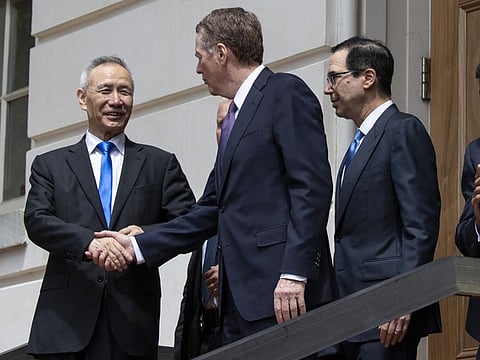There are no winners in tariff wars
Trade standoff between the world’s largest two economies can shrink global trade

A series of data and analysis on the current state of the global economy points to a slowdown in trade, buffeted by the ongoing trade and tariff dispute between Washington and China. The International Monetary Fund is sounding the alarm over the effects the current tariffs imposed by the United States and by China as retaliatory measures are having on growth, with warnings that trade levels may only reach those set in 2016.
This is a standoff between the world’s largest two economies, and any limits or impediments to the free flow of goods between the two have an impact beyond their respective economies. While both Washington and Beijing are free to engage and implement in a standoff with tariffs as the main strategy, the reality is that it is consumers of goods affected by the measures that are being penalised. The lesson of the past three decades, where globalisation and the free and unfettered movement of goods around the world has brought unparalleled levels of growth and prosperity, is that the long-term imposition of tariffs and the conduct of trade in such a curtailed environment is not conducive to growing economies.
Certainly, there are political factors at play in the current environment, and those factors are not conducive to creating an environment where goods move freely. The knock-on effect, beyond the borders of both the US and China, is significant. The reality is the world’s economy, its manufacturing processes, the movement of raw materials, the shipping of goods around the planet, is now predicated on there being no regulatory, customs or tariff impediments. Simply put, trade is now so seamless, so intertwined, that the use of tariffs either as a first measure or as a means of retaliation, simply effects far more than the two main players.
By their very nature, tariffs essentially are a consumer tax where purchasers, who want to buy a particular good manufactured and subsequently targeted by authorities for tariffs, end up paying that new price at the point of sale. And those increases are inevitably passed onto consumers.
Between both nations, tariffs have been applied to goods worth $370 billion, with the potential for much more should the current dispute escalate. Given the warnings from the IMF, the current level of tariffs are already having a detrimental effect on the global economy, one where other nations are being sideswiped by this dispute. Certainly, it would not be prudent if these tariffs impacted unduly on both economies, with other trading nations also being pulled into this vortex. Tariffs are a negotiating tactic to make a point — and as the IMF reports notes, that point is being made.



